八年级英语unit9have you ever been to a musuem教案
unit9haveyoueverbeentoamuseum知识点梳理及单元复习
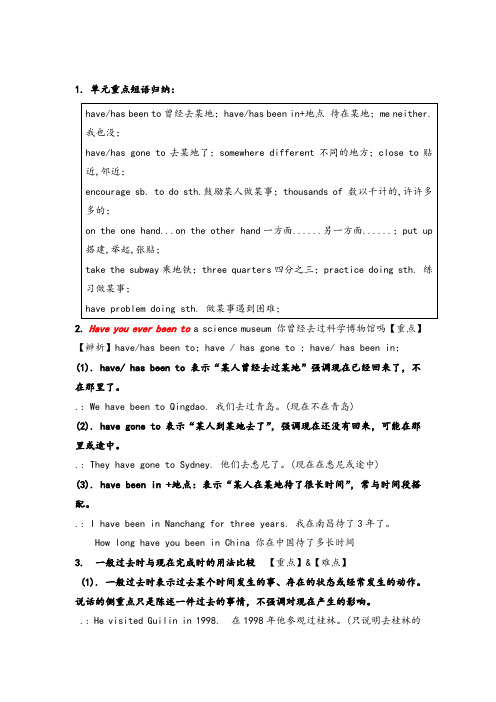
1. 单元重点短语归纳:2. Have you ever been to a science museum 你曾经去过科学博物馆吗【重点】【辨析】have/has been to;have / has gone to ;have/ has been in;(1). have/ has been to 表示“某人曾经去过某地”强调现在已经回来了,不在那里了。
.: We have been to Qingdao. 我们去过青岛。
(现在不在青岛)(2). have gone to表示“某人到某地去了”,强调现在还没有回来,可能在那里或途中。
.: They have gone to Sydney. 他们去悉尼了。
(现在在悉尼或途中)(3). have been in +地点:表示“某人在某地待了很长时间”,常与时间段搭配。
.: I have been in Nanchang for three years. 我在南昌待了3年了。
How long have you been in China 你在中国待了多长时间3. 一般过去时与现在完成时的用法比较【重点】&【难点】(1). 一般过去时表示过去某个时间发生的事、存在的状态或经常发生的动作。
说话的侧重点只是陈述一件过去的事情,不强调对现在产生的影响。
.: He visited Guilin in 1998. 在1998年他参观过桂林。
(只说明去桂林的时间)(2). 现在完成时表示动作发生在过去,对现在造成了影响或产生了结果。
不能与确定的过去时间状语连用。
.: Jill has bought a new computer. 吉尔买了一台新电脑。
I have taught here for fifteen years. 我在这儿教学已经15年了。
I have seen the film. 我看过这部电影。
(我了解这部电影的内容)I saw the film last week. 我上周看了这部电影。
人教新目标英语八年级下册讲义—Unit 9 Have you ever been to a ……

新目标八年级下册Unit 9 Have you ever been to a museum ?讲义一、重点单词1. amusement n. 娱乐; 游戏2. somewhere adv. 在某处; 到某处3. camera n. 照相机; 摄影机; 摄像机4. invention n. 发明物5. invent v. 发明; 创造1. unbelievable adj. 难以置信的; 不真实的2. progress n. 进步; 进展3. rapid adj. 迅速的; 快速的4. unusual adj. 特别的; 不寻常的5. toilet n. 坐便器; 厕所6. encourage v. 鼓励7. social adj. 社会的8. peaceful adj. 和平的; 安宁的9. performance n. 表演; 演出10. perfect adj. 完美的; 完全的11. itself pron.(it的反身代词) 它自己12. collect v. 收集; 采集13. German adj. 德国的; 德语的; 德国人的n. 德语; 德国人14. theme n. 主题15. ride n. 供乘骑的游乐设施; 短途旅程16. province n. 省份17. simply adv. 仅仅; 只; 不过18. fear v. & n. 害怕; 惧怕19. whether conj. 不管......;还是); 或者......(或者); 是否20. Indian adj.印度的 n. 印度人21. Japanese adj.;日本的; 日本人的; 日语的n. 日本人; 日语22. equator n. 赤道23. whenever conj. 在任何......时候; 无论何时24. spring n. 春天25. mostly adv. 主要地; 通常26. location n. 地点; 位置二、短语归纳1.at night在夜晚2.in a more natural environment在一个更加自然的环境中3.all year round 全年4.be far from 离……远5.in the dark 在黑暗中6.in the past 在过去7.have been to sp. 去过某地8.science museum 科学博物馆9.history museum 历史博物馆10.amusement park 游乐园11.go somewhere different 去不同的地方12.go skating 去滑冰13.take the subway 坐地铁14.a great way to spend a Saturday afternoon一个过周六下午的好方法15.all the old movie cameras所有的古老的电影摄影机16.learn about sth.解有关……的情况17.on the weekend 在周末18.camp in the mountains 在大山里露营19.put up a tent搭帐篷20.in such a rapid way 以如此迅猛的方式21.different kinds of各种各样的22.development of toilets 厕所的发展23.social groups 社会团体24.the tea art performances茶艺表演25.make a perfect cup of tea with beautiful tea sets用漂亮的茶具沏一杯完美的茶26.a nice place to enjoy tea 一个品茶的好地方27.thousands of 数以千计的28.International Museum of Toilets国际厕所博物馆29.the Terracotta Army 兵马俑30.Southeast Asia东南亚31.Night Safari 夜间动物园32.three quarters 四分之三33.an English-speaking country一个讲英语的国家34.have problem doing sth. 做某事很困难35.during the daytime在白天36.a couple of times 好几次37.right now 现在;目前38.an amusement park with a special theme一个有特别的主题的游乐园39.walk around the park 在公园里到处走40.hear of 听说41.take a ride兜风42.another province另一个省43.the Bird’s Nest鸟巢44.encourage sb. to do sth.鼓励某人做某事45.on the one hand... on the other hand.一方面,另一方面三、句型集萃1.a great way to do sth一个做某事的好办法2.It’s unbelievable that很难相信……3.watch sb do sth.看某人做了某事4.encourage sb to do sth鼓励某人做某事5.as..as和。
2019年春八年级英语下册 Unit 9 Have you ever been to a mus
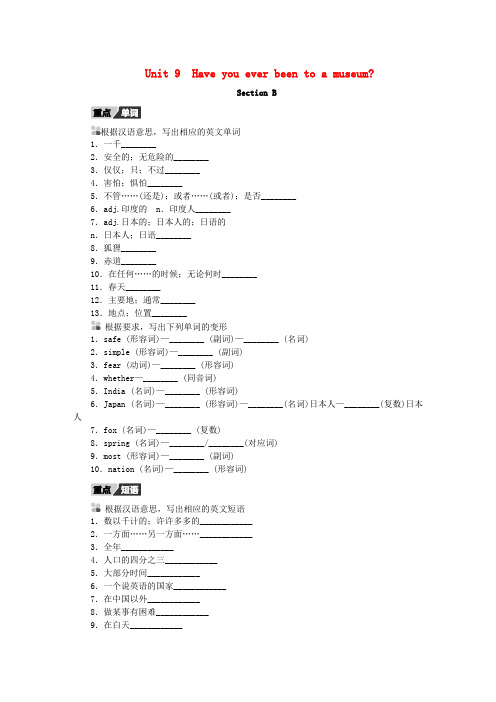
Unit 9 Have you ever been to a museum?Section B1.一千________2.安全的;无危险的________3.仅仅;只;不过________4.害怕;惧怕________5.不管……(还是);或者……(或者);是否________6.adj.印度的n.印度人________7.adj.日本的;日本人的;日语的n.日本人;日语________8.狐狸________9.赤道________10.在任何……的时候;无论何时________11.春天________12.主要地;通常________13.地点;位置________根据要求,写出下列单词的变形1.safe (形容词)—________ (副词)—________ (名词)2.simple (形容词)—________ (副词)3.fear (动词)—________ (形容词)4.whether—________ (同音词)5.India (名词)—________ (形容词)6.Japan (名词)—________ (形容词)—________(名词)日本人—________(复数)日本人7.fox (名词)—________ (复数)8.spring (名词)—________/________(对应词)9.most (形容词)—________ (副词)10.nation (名词)—________ (形容词)根据汉语意思,写出相应的英文短语1.数以千计的;许许多多的____________2.一方面……另一方面……____________3.全年____________4.人口的四分之三____________5.大部分时间____________6.一个说英语的国家____________7.在中国以外____________8.做某事有困难____________9.在白天____________10.做某事的最好时间____________11.靠近;接近____________12.选择做某事____________13.远离____________14.在黑暗中____________根据汉语意思完成句子1.新加坡是一个说英语的国家。
郑州市八年级英语下册Unit9Haveyoueverbeentoamuseum必考知识点归纳

郑州市八年级英语下册Unit9Haveyoueverbeentoamuseum必考知识点归纳单选题1、We _______ Beijing many times, so we know it very well.A.have been inB.went toC.have been toD.have gone to答案:C句意:我们去过北京很多次,所以对北京很了解。
考查动词时态。
have been in在某地,表示状态;went to一般过去时态;have been to去过某地,已回来;have gone to去了某地,还未回来。
根据“We...Beijing many times, so we know it very well”可知,应该是去过某地,故选C。
2、David broke Lucy’s computer, but he managed to repair it by ________. A.itselfB.myselfC.herselfD.himself答案:D句意:他弄坏了露西的电脑,但他设法自己把它修好了。
考查反身代词。
itself它自己;myself我自己;herself她自己;himself他自己。
根据固定搭配“by oneslf”可知,此空用反身代词;主语是“he”,因此用反身代词“himself”。
故选D。
3、—________ you are rich or poor, you should study hard.—Y ou’re right. ________ I work harder, I will have a better future.A.If; WhetherB.Whether; IfC.If; IfD.Whether; Unless答案:B句意:——无论你是富有还是贫穷,你都应该努力学习。
——你说得对。
如果我更加努力,我会有一个更好的未来。
考查连词辨析。
人教新目标版初中英语八年级下册Unit9Haveyoueverbeentoamuseum要点讲解
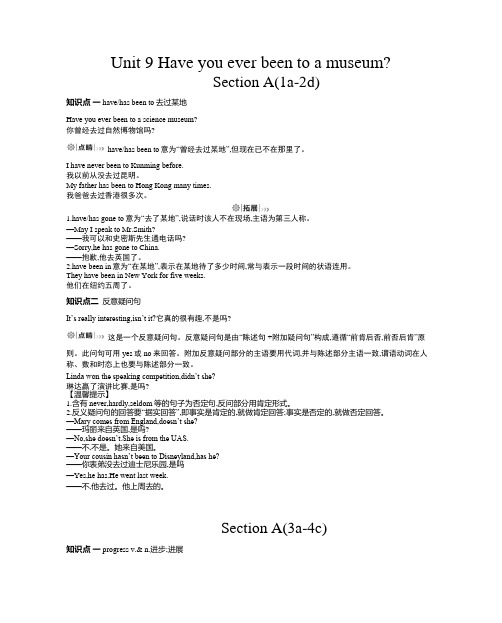
Unit 9 Have you ever been to a museum?Section A(1a-2d)知识点一have/has been to去过某地Have you ever been to a science museum?你曾经去过自然博物馆吗?have/has been to意为“曾经去过某地”,但现在已不在那里了。
I have never been to Kunming before.我以前从没去过昆明。
My father has been to Hong Kong many times.我爸爸去过香港很多次。
1.have/has gone to意为“去了某地”,说话时该人不在现场,主语为第三人称。
—May I speak to Mr.Smith?——我可以和史密斯先生通电话吗?—Sorry,he has gone to China.——抱歉,他去英国了。
2.have been in意为“在某地”,表示在某地待了多少时间,常与表示一段时间的状语连用。
They have been in New York for five weeks.他们在纽约五周了。
知识点二反意疑问句It’s really interesting,isn’t it?它真的很有趣,不是吗?这是一个反意疑问句。
反意疑问句是由“陈述句 +附加疑问句”构成,遵循“前肯后否,前否后肯”原则。
此问句可用yes或no来回答。
附加反意疑问部分的主语要用代词,并与陈述部分主语一致,谓语动词在人称、数和时态上也要与陈述部分一致。
Linda won the speaking competition,didn’t she?琳达赢了演讲比赛,是吗?【温馨提示】1.含有never,hardly,seldom等的句子为否定句,反问部分用肯定形式。
2.反义疑问句的回答要“据实回答”,即事实是肯定的,就做肯定回答;事实是否定的,就做否定回答。
—Mary comes from England,doesn’t she?——玛丽来自英国,是吗?—No,she doesn’t.She is from the UAS.——不,不是。
人教版英语八下U9Have you ever been to a museum 讲义

Unit9 Have you ever been to a museum?一、重点词汇及拓展1. amusement n. 娱乐;游戏e.g. The old ladies played the games just for amusement.老太太们玩这个游戏只是为了取乐。
amuse v. 消遣,逗笑;使开心,使愉快amusing adj. 有趣的,好玩的,好笑的amused adj. 被逗乐的;感到好笑的2.amusement park 游乐场e.g. The amusement park is open from May through October.游乐园从五月到十月开放。
3.somewhere adv. 在何处;到某处pron. 某个地方e.g. Maybe the keys are somewhere in the dining room.也许钥匙在餐厅某个地方。
I need to find somewhere to stay tonight.我得找到今晚要住的地方。
4.camera n.照相机;摄影机;摄像机e.g. I heard your parents bought you a cameras as a gift.我听说你的父母亲给你买了一台照相机作为礼物。
5.invention n.发明;发明物e.g. Do you think mobile phone is a great invention?你认为手机是一个伟大的发明吗?6.invent v.发明;创造inventor n.发明家invention n.发明;发明物e.g. As we all know that Edison invented light bulb.我们都知道爱迪生发明了灯泡。
7. unbelievable adj. 难以置信的;不真实的unbelievably adv. 难以置信地;不真实地unbelievably bad/good 坏得/好得令人难以置信incredible adj. 难以置信的e.g. I still find this story both fascinating and unbelievable.我仍然觉得这个故事非常有趣和难以置信。
Unit9单元讲义人教版八年级英语下册

Unit9 Have you ever been to a museum?单词短语及重点句型一、单词讲解1 somewhere adv.在某处;到某处somewhere 不定副词,意为“某地”。
go somewhere different 意为“去与众不同的某地,去某个独特的地方”。
I want to go somewhere different and live alone. 我想去一个与众不同的地方独自生活。
拓展:由some, any, no, every分别加上where构成的副词叫不定副词。
即:somewhere 某个地方, anywhere 任何地方, nowhere 无处,哪里都不, everywhere 每个地方。
2 invent v.发明;创造1)invent 作动词,意为“发明;创造”。
Edison invented the light bulb. 爱迪生发明了电灯。
2)invent还可以表示“虚构”。
The whole story was invented. 整个故事是虚构的。
3)invent的名词形式有两个,一个是inventor(发明者;发明家),另一个是invention(发明物)。
Edison is a great inventor in history. 爱迪生是历史上伟大的发明家。
辨析:invent和discover的辨析:①invent 意为“发明,发明之物”指“从无到有”。
Alexander Graham Bell invented the telephone in 1876. 亚历山大•格雷厄姆•贝尔在1876年发明了。
②discover 意为“发现”,指“本来就已经存在,但不为人知”的事物。
Columbus discovered America in 1492. 哥伦布在1492年发现了美洲。
3 unbelievable adj.难以置信的;不真实的unbelievable作形容词,意为“难以置信的;不真实的”,是由believable“可相信的;可信任的”加否定前缀un派生而来的。
Unit-9--Have-you-ever-been-to-a-museum--知识整理
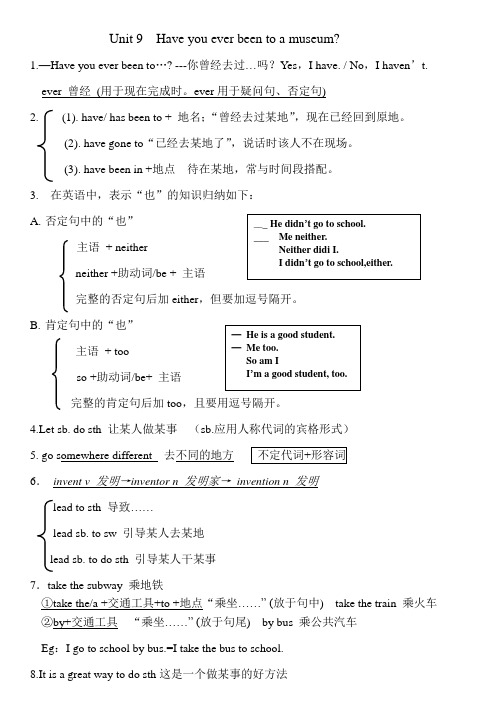
Unit 9 Have you ever been to a museum?1.—Have you ever been to …? ---你曾经去过…吗?Yes ,I have. / No ,I haven ’t. ever 曾经 (用于现在完成时。
ever 用于疑问句、否定句)2.(1). have/ has been to + 地名;“曾经去过某地”,现在已经回到原地。
(2). have gone to “已经去某地了”,说话时该人不在现场。
(3). have been in +地点 待在某地,常与时间段搭配。
3. 在英语中,表示“也”的知识归纳如下:A. 否定句中的“也”主语 + neitherneither +助动词/be + 主语 完整的否定句后加either ,但要加逗号隔开。
B. 肯定句中的“也”主语 + tooso +助动词/be+ 主语 完整的肯定句后加too ,且要用逗号隔开。
4.Let sb. do sth 让某人做某事 (sb.应用人称代词的宾格形式)5. go somewhere different 去不同的地方 6. invent v 发明→inventor n 发明家→ invention n 发明lead to sth 导致……lead sb. to sw 引导某人去某地lead sb. to do sth 引导某人干某事7.take the subway 乘地铁①take the/a +交通工具+to +地点“乘坐……” (放于句中) take the train 乘火车 ②by+交通工具 “乘坐……” (放于句尾) by bus 乘公共汽车Eg :I go to school by bus.=I take the bus to school.8.It is a great way to do sth 这是一个做某事的好方法9. go skating 去滑冰10. .on the weekend 在周末11. science museum 科学博物馆history museum 历史博物馆12.all the old movie cameras所有的古老的电影摄影机13.camp in the mountains 在大山里露营14.learn about 了解获知,得知learn about sth.了解有关……的情况15. an amusement park 一个游乐场16. the International Museum国际博物馆17. put up a tent 搭帐篷put up 搭起;举起;张贴rmation信息;资料(不可n.)some informationa piece of information 与about 连用,表示:“关于……的信息”19.It’s unbelievable that+从句“令人难以置信的……”20. make progress 取得进步make progress in 在......方面取得进步21.in such a rapid way 以如此迅猛的方式22.play chess 下棋23.be able to+V原能够做某事24.in the future在将来25.wonder 想要知道= want to know①后接从句eg:I wonder who she is.②也可接“疑问词+不定式”eg: I wonder what to do next.26.I couldn’t believe my eyes我无法相信我的眼睛。
八下新目标英语Unit_9_Have_you_ever_been_to_a_museum?

【2012贵州贵阳】 “Have you ever been to Tokyo?” “Yes, I ______ there twice. It’s a modern city.”
A. have gone B. have been C. had gone
【答案】B
考查动词时态及动词的用法。问句用的是现 在完成时,答句也应该用现在完成时,前后 时态一致。have gone意为“去过,但还没回 来”;have been意为“去了,回来了”。根 据句意:你去过东京吗?我去过两次,它是 一个现代城市。故选B.
the final.
— I think so. He ________ for it for months.
A. is preparing
B. was preparing
C. had been preparing
D. has been preparing
2. By the time he realizes he _________ into a
D. Did; show
8. — Hi, Tracy, you look pale.
— I am tired. I ______ the living room all day.
A. painted
B. had painted
C. have been painting D. have painted
C. considered D. is going to consider
7. —______ you ______ him around the museum
yet?
—Yes. We had a great time there.
A. Have ; shown
人教版八年级英语下册Unit9 Have you ever been to a museum知识点梳理及单元复习
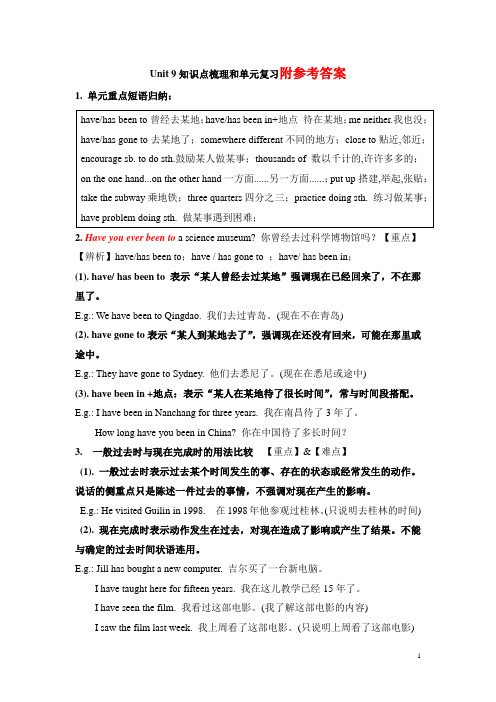
Unit 9知识点梳理和单元复习附参考答案1. 单元重点短语归纳:have/has been to曾经去某地;have/has been in+地点待在某地;me neither.我也没;have/has gone to去某地了;somewhere different不同的地方;close to贴近,邻近;encourage sb. to do sth.鼓励某人做某事;thousands of 数以千计的,许许多多的;on the one hand...on the other hand一方面......另一方面......;put up搭建,举起,张贴;take the subway乘地铁;three quarters四分之三;practice doing sth. 练习做某事;have problem doing sth. 做某事遇到困难;2. Have you ever been to a science museum? 你曾经去过科学博物馆吗?【重点】【辨析】have/has been to;have / has gone to ;have/ has been in;(1). have/ has been to 表示“某人曾经去过某地”强调现在已经回来了,不在那里了。
E.g.: We have been to Qingdao. 我们去过青岛。
(现在不在青岛)(2). have gone to表示“某人到某地去了”,强调现在还没有回来,可能在那里或途中。
E.g.: They have gone to Sydney. 他们去悉尼了。
(现在在悉尼或途中)(3). have been in +地点:表示“某人在某地待了很长时间”,常与时间段搭配。
E.g.: I have been in Nanchang for three years. 我在南昌待了3年了。
How long have you been in China? 你在中国待了多长时间?3. 一般过去时与现在完成时的用法比较【重点】&【难点】(1). 一般过去时表示过去某个时间发生的事、存在的状态或经常发生的动作。
河南省八年级英语下册Unit9Haveyoueverbeentoamuseum必考知识点归纳

河南省八年级英语下册Unit9Haveyoueverbeentoamuseum必考知识点归纳单选题1、The Great Wall is a place of interest. All of us ________ there before.A.has beenB.have beenC.has goneD.have gone答案:B句意:长城是个名胜古迹。
我们所有人以前都去过那里。
考查现在完成时。
have/has been表示去过某地又回来了;have/has gone表示去了某地还没回来。
主语“All of us”是复数,用have而不用has,排除AC;根据before可知应该是去过,现在已经回来,用have been而不用have gone,排除D。
故选B。
2、—I have ________ been to Tibet. How about you?—Me. neither.A.neverB.everC.already答案:A句意:--我从没去过西藏。
你呢? --我也没有去过。
根据neither “我也没有去过”提示,可知问句是没去过,never从不,ever曾经,already已经;故选A。
3、David has never been to Australia, ________?A.hasn’t heB.doesn’t heC.has heD.does he答案:C句意:大卫从未去过澳大利亚,是吗?考查反义疑问句。
题干中“has never been”是现在完成时,助动词为has,never表否定。
反义疑问句中如果陈述句为否定,反义疑问句的后半部分应用肯定疑问句。
故选C。
4、— ________ you ever ________ to Hong Kong?— Yes, only once.A.Did; goB.Have; goneC.Do; goD.Have; been答案:D句意:——你去过香港吗?——是的,只有一次。
八年级英语下册Unit9Haveyoueverbeentoamuseum短语语法知识点汇总新版人教新目标版20180827464

Unit 9 Have you ever been to a museum一、必背短语1.一年到头;终年all year round2.离……远be far from3.在黑暗中in the dark4.在过去 in the past5.去过某地have been to sp.6. 游乐园amusement park7.搭帐篷put up a tent 8.在大山里露营camp in the mountains9.了解有关…的情况learn about sth. 10.以如此迅猛的方式in such a rapid way11.社会团体social groups 12.数以千计的thousands of13.四分之三three quarters 14.一个讲英语的国家an English-speaking country15.在白天during the daytime 16.好几次 a couple of times17. 现在;目前right now 18. 在公园里到处走walk around the park19.兜风take a ride 20.听说hear of22.遗留、留下leave behind21鼓励某人做某事encourage sb. to do sth.23.在某方面取得进步make progress in... 24.一方面on the one hand25.另一方面on the other hand【教材内容解析】Section A1. Me neither (P. 65)me neither意为“我也不……”,表示前者的否定情况也适用于我,反义词为me too。
---Susan can’t play the piano at all.---Me neither.2. Let’s go to one tomorrow. (P. 65)one是不定代词,用来代替前面出现过的可数名词单数,如果指代名词复数,用ones。
初二下册unit-9-Have-you-ever-been-to-a-museum-整-导入+听力+

Jack isn’t at home, neither am I / me neither. She doesn’t like playing basketball, neither do I / me neither. The woman hasn’t been to France, neither has he / him neither. He can’t speak English, neither can she / her neither.
space museum____ history museum____
art museum ____ water park ____
zoo ____
amusement park ____
Pre-Listening
1. When did Sarah visit the National science Museum? A. Today B. Yesterday C. Last year
A. neither can my sister B. my sister can’t, too
C. so can’t my siserD. can my sister, either
1. Read the conversation and answer the questions. 1). When did Anna go to the film museum?
art museum Have you ever been to an art museum?
water park Have you ever been to a water park?
zoo Have you ever been to a zoo?
八年级英语下册 Unit 9 Have you ever been to a museum语法专题—

3.—Have you seen Dr.Qian recently? —No.He _C___ Japan for an important meeting.He'll come back next week. A.has gone B.has been to C.has gone to D.has been 4.—Have you __C__ been to Guangxi? —Yes,I have.I ________ there last summer. A.ever;go B.never;went C.ever;went D.never;go
第8页
9.We went to the science museum last week.(对画线部分提问) ___W__h_e_n__d_id___ you __g_o_ to the science museum? 10.My parents have been to the Great Wall.(对画线部分提问) __W__h_e_r_e_h_a_v_e__ your parents__b_e_e_n___?
第9页
三、依据对话内容,用have/has been(to)或have/has gone(to)填空。 A:Hi,Roger! Where is everybody?The house is very quiet. B:Well,Mom 11.__h_a_s__g_o_n_e_t_o____ the cinema with Jane. A:How about your sister? B:She's taking a shower right now because she 12.__h_a_s_b_e_e_n__to__ the gym(健身房). A:I 13._h__a_ve__b_e_e_n_t_o__ the gym twice this week.It's really tiring.
英语八年级下册 Unit9 Have you ever been to a museum单元短语过关

人教版英语八年级下册第九单元短语过关Unit 9 Have you ever been to a museum?1. a science museum 一个科学博物馆2. a space museum 一个太空博物馆3. a history museum 一个历史博物馆4.an art museum 一个艺术博物馆5.water park 水上乐园6.amusement park 游乐场7.somewhere different 某个不同的地方;不定副词,后接形容词;例如:For my next vacation , I ‘d like to go somewhere different. 下次度假,我想去个不同的地方。
st year 去年9.at night在夜晚;at noon在中午10.have \ has been to ... 去过...;例如:I have been to a wonderful placewith big gardens. 我去过一个带有很多花园的美景之地。
have \ has gone to ... 去了;例如:She can’t find Mr. Green , he has gone to Beijing. 她不能找到格林先生,他去了北京。
11.go skating 去滑冰12.take the subway 乘坐地铁13.camp in the mountains 在山上野营;例如:During the summervacation , we camped in the mountains and it was fun. 暑假期间,我们在山上野营,非常有趣。
14.put up the tent 搭建帐篷;put up 还可以表示张贴;例如:They putup their tent and slept under the tree.他们搭建好帐篷,在树下睡了。
【人教英语】八下Unit 9 Have you ever been to a museum课文重难点详解 Section A
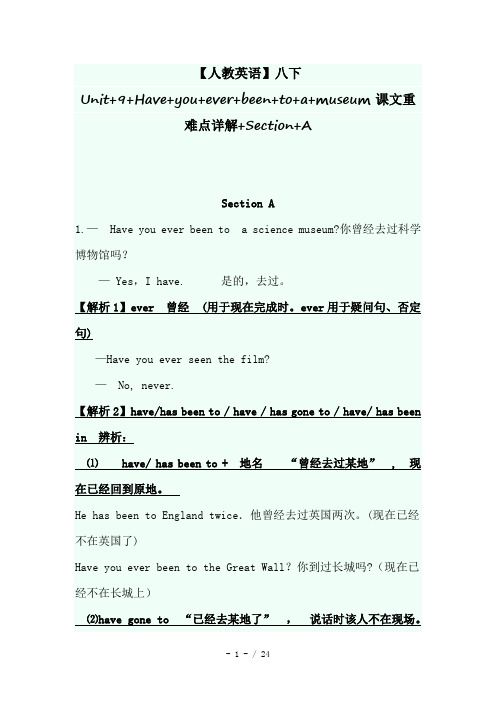
【人教英语】八下Unit+9+Have+you+ever+been+to+a+museum课文重难点详解+Section+ASection A1.—Have you ever been to a science museum?你曾经去过科学博物馆吗?— Yes,I have. 是的,去过。
【解析1】ever 曾经(用于现在完成时。
ever用于疑问句、否定句)—Have you ever seen the film?—No, never.【解析2】have/has been to / have / has gone to / have/ has been in 辨析:⑴have/ has been to + 地名“曾经去过某地”, 现在已经回到原地。
He has been to England twice.他曾经去过英国两次。
(现在已经不在英国了)Have you ever been to the Great Wall?你到过长城吗?(现在已经不在长城上)⑵have gone to“已经去某地了”,说话时该人不在现场。
He has gone to England。
他已去英国了。
(已经不在说话的地方,到达英国或者在去英国的路上)( ) Mary isn’t here. She has ____ the shop.A. been toB. went toC. gone toD. /【2013江苏中考1】A number of tourists ____ Yangzhou many times because it is such a beautiful city.A. have been toB. has been toC. has gone toD. have gone to⑶have been in +地点待在某地,常与时间段搭配。
I have been in Shanghai for three years.2. Me neither 我也没有。
河南省八年级英语下册Unit9Haveyoueverbeentoamuseum解题方法技巧

河南省八年级英语下册Unit9Haveyoueverbeentoamuseum解题方法技巧单选题1、—Hi, Tom! _________ you ever _________ the Bird’s Nest?—Yes, I have. It’s fantastic.A.Have; been toB.Have; gone toC.Did; go to答案:A句意:——嗨!汤姆!你去过鸟巢吗?——是的,我去过。
那太棒了!考查现在完成时。
由答语“Yes, I have.”可知,问句用现在完成时,排除C项;have been to表示“曾经去过某地(现在已经回来了)”;have gone to表示“去了某地(还没有回来)”。
分析语境可知,此处是问“你曾经去过鸟巢吗?”,应用have been to。
故选A。
2、—Do you like English?—Yes, but I think__________ is a great challenge to learn the language well.A.thatB.thisC.it答案:C句意:——你喜欢英语么?——是的,但是我认为把语言学好是一种挑战。
考查代词。
that那个;this这个;it它。
think后是省略that的宾语从句,不定式“to learn the language well”是从句的真正的主语,此处用it做宾语从句的形式主语。
故选C。
3、—Where’s your English teacher?— She ________ to Beijing. She’ll be back in a week.A.has beenB.has goneC.goesD.went答案:B句意:——你的英语老师在哪儿?——她去了北京。
她将在一周后回来。
考查动词时态。
have been to…“去过某地”;have gone to…“去了某地”,根据“She’ll be back in a week.”可知,她去了北京,现在不在这儿,用“have/has gone to +地点”来表示。
八年级英语下册 Unit 9《Have you ever been to a mus
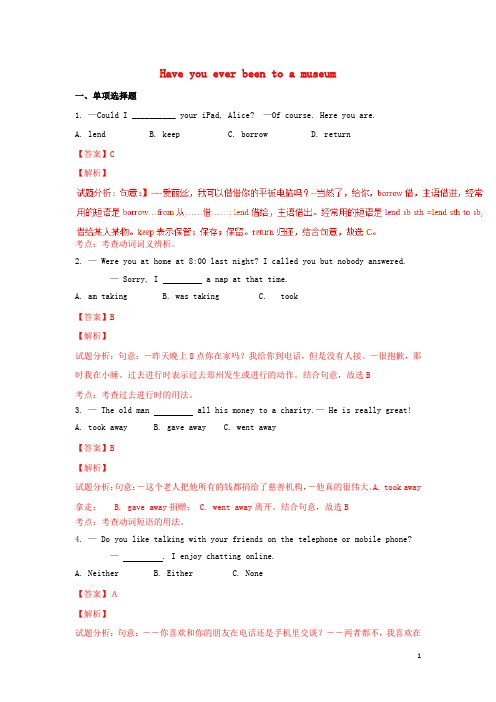
Have you ever been to a museum一、单项选择题1. —Could I __________ your iPad, Alice? —Of course. Here you are.A. lendB. keepC. borrowD. return【答案】C【解析】考点:考查动词词义辨析。
2. — Were you at home at 8:00 last night? I called you but nobody answered.— Sorry, I a nap at that time.A. am takingB. was takingC. took【答案】B【解析】试题分析:句意:―昨天晚上8点你在家吗?我给你到电话,但是没有人接。
―很抱歉,那时我在小睡。
过去进行时表示过去郑州发生或进行的动作。
结合句意,故选B考点:考查过去进行时的用法。
3. — The old man all his money to a charity.— He is really great!A. took awayB. gave awayC. went away【答案】B【解析】试题分析:句意:―这个老人把他所有的钱都捐给了慈善机构,―他真的很伟大。
A. took away 拿走; B. gave away捐赠; C. went away离开。
结合句意,故选B考点:考查动词短语的用法。
4. — Do you like talking with your friends on the telephone or mobile phone?— . I enjoy chatting online.A. NeitherB. EitherC. None【答案】A【解析】试题分析:句意:――你喜欢和你的朋友在电话还是手机里交谈?――两者都不,我喜欢在线交谈。
none 与all 用于三者以上的复数,none 为否定,all 为肯定。
八年级英语下册 Unit 9 Have you ever been to a museum复习 (新版)人教新目标版

Unit 9 Have you ever been to a museum?默写1 Section A 1a~2d一、默写课文中的单词。
1. 照相机;摄影机;摄像机 ______2. amusement n. ______3. somewhere adv. ______4. invention n. ______二、默写课文中的短语。
1. 游乐场 ______2. 去过 ______3. 科学博物馆 ______4. 某个不同的地方 ______5. 太空博物馆 ______6. 玩得很开心 ______7. 了解;获知 ______ 8. 彩色电影 ______9. 电影摄像机 ______ 10. 搭建 ______三、根据汉语提示完成下列句子。
1. 你曾经去过一家科学博物馆吗?______ you ______ ______ ______ a science museum?2. 弗兰克在水上公园玩得很开心。
Frank ______ ______ ______ ______ at the water park.3. 约翰从没有去过太空博物馆。
John ______ ______ ______ ______ the space museum.4. 你曾经去过那儿吗?Have you ever ______ ______ ?5. 它是一个度过周六下午的好方式。
It’s a great way ______ ______ a Saturday afternoon.6. 我还了解一些发明,它们成就了彩色电影。
I learned about the inventions that ______ ______ color movies, too.7. 我从未野营过。
I’ve never ______ ______ .知识积累somewhere与 anywhere的用法辨析:相同点:都表示“在某处”。
不同点:somewhere多用于肯定句中;anywhere多用于疑问句和否定句中。
八年级英语下册Unit9Haveyoueverbeentoamuseum单元语法知识梳理人教版

Unit 9 Have you ever been to a museum现在完成时(Ⅱ)1.现在完成时表示经历的用法现在完成时常用have been to(去过),ever(曾经),never(从没)等表示经历。
用法说明示例have / has been to表示去过某地,可以与never,ever,just,once等连用。
Mr. Smith has ever been to China three times.史密斯先生曾去过中国三次。
ever常用于现在完成时的一般疑问句中,放在主语之后,过去分词之前。
Have you ever visited the Palace Museum? 你曾参观过故宫博物馆吗?never表示否定,用在助动词have / has之后,过去分词之前。
表示否定的简短回答可以用neither。
—I have never been to Hong Kong.我从来没去过香港。
—Me neither.我也没去过。
2.have/ has been to与have / has gone to的用法区别用法说明示例have/ has been to意为“去过某地”,表示去过某地,现在已经回来了,通常与表示次数的状语连用,如twice,several times,ever,never等She has been to Europe twice.她去过欧洲两次。
(已经回来了)I have never been to the Great Wall.我从未去过长城。
have / has gone to意为“去了某地”,表示到某地去了,强调说话时去某地的人不在场(可能在途中,也可能已到达)。
—Where is Jim? 吉姆在哪里?—He has gone to England.他去英国了。
(现在不在这里)若have/ has been to或have / has gone to后接副词,则省略to。
- 1、下载文档前请自行甄别文档内容的完整性,平台不提供额外的编辑、内容补充、找答案等附加服务。
- 2、"仅部分预览"的文档,不可在线预览部分如存在完整性等问题,可反馈申请退款(可完整预览的文档不适用该条件!)。
- 3、如文档侵犯您的权益,请联系客服反馈,我们会尽快为您处理(人工客服工作时间:9:00-18:30)。
Unit 9 Have you ever been to a museum?Section A 1a-1c教学设计Unit 9 Have you ever been to a museum?Section A 1a-1c一、教材分析本课是新目标英语八年级下册第九单元第一课时,本课时将通过一系列的听说活动训练来加深对现在完成时的理解和运用。
1a呈现了几个有趣的地方,在帮助学生学习新词汇的同时,也激发他们的学习兴趣。
1b是听力活动,呈现了本单元的目标语言,谈论去过某地。
1b要求学生听录音对话,判断Claudia和Sarah 分别去过哪些地方;在此基础上对听力内容进行拓展,要求学生听出对话细节。
拓展的口语活动要求试用新句型,谈论去过哪些地方,再次对目标语言进行训练。
二、教学目标(1)知识目标a. 掌握以下单词:amusement park, space museum, water park, neither,b. 掌握如何表达现在完成时,并能运用Have you ever been to a museum? Yes, Ihave /No, I haven’t的句式进行提问和应答。
c. 能用英语谈论过去的经历,谈论你曾经去过某地。
(2)能力目标:培养学生用英语思维的能力和初步运用英语交际的能力,使学生能够在生活情景中运用所学语言,达到交流的目的。
(3)德育目标:通过询问别人曾经去过哪些有趣的地方,引导学生学会与别人分享快乐,发现身边美好事物。
三、教学重点熟练掌握have ( has) been to…的用法。
四、教学难点熟练掌握和灵活运用现在完成时来谈论某人是否曾经去过某地。
五、学情分析学生在七年级已学过用一般过去时来描述过去的经历,在八年级unit8初步接触了用现在完成时,熟练使用需要教师的正确引导。
六、教学方法情景教学法、小组合作学习、任务型教学法七、教学过程Step1.Revision()1. Have you met Mr. Li ______?A. yesterdayB. agoC. yetD. a moment ago()2. We ______ Xiao Li since she was a little girl.A. knowB. had knownC. have knownD. knew()3. ____you______ the text yet? Yes, we ________it two hours ago.A. Did; copy; didB. Have; copied; haveC. Have; copied; didD. Did; have()4. I _____ my grandpa last Sunday.A. have visitedB. visitedC. was visitingD. has visited()5. I ______ today’s homework already. What about you?A. have finishedB. finishC. to finishD. finishing( ) 6.His parents look sad. Maybe they ______what’s happened to himA. knewB. have knowC. knowD. will know(设计意图:通过习题检测学生对现在完成时的掌握程度为接下来的教学提供参考)Step2.leading-in人一定要旅行,一个人的见识很重要,你见得多了,自然心胸就会豁达,视野宽广,会影响到你对很多事情的看法,旅行让人见多识广,它会让你更有信心,不会在物质世界里迷失方向。
In unit 9 we will talk about where you have ever been.(设计意图:通过微博上的一段话,自然导入“你曾经去过某地”这一话题。
揭开了本课的序幕,这使陌生的师生之间多了一些了解,增加了些亲和力,拉近了师生之间的情感距离,营造出宽松的学习环境。
)Step3.Preview 预习检测1.太空博物馆_______________________2.水上公园_________________________3.游乐场____________________________4.乘地铁__________________________5.你去过科学博物馆吗?_______________________________________________ 是的,去过____________________________不,没去过______________________6.我也是(我也去过)_____________________我也没去过___________________7.我去过艺术博物馆很多次_____________________________________________8.我从没去过那儿_____________________________________________________ (设计意图:采用竞赛的教学方法,检测学生预习情况,既调动了学生的学习积极性,刺激学生积极思考、快速反应,做到在短时间内自觉掌握并运用新知识去解决目前面临的问题。
)Step4.drills1.show the Ss the picture of the Great Wall and Sanya. And make conversationswith them like this:①T: Have you ever been to the Great Wall?S1: Yes, I have. I have been there before.T: So have I.②T: Have you ever been to Sanya?S1: No, I haven’t. I haven’t been there before.T: Neither have I.2. Ss talk about the places in 1a, then ask then to show the conversations.(设计意图:通过图片及和老师之间的交流感知新的句型)Step4.listening1.Pay attention to the instructions: Claudia and Sarah are talking about these places,check where they have been.2.Play the recording, check the answers. (Has Claudia been to the Space museum?)3.Play the recording again, and answer some questions.()1. When did Sarah visit the National Science Museum?A. TodayB. YesterdayC. Last year()2. When did Claudia visit the nature museum?A. Last yearB. Last summerC. Last school trip()3. What may the relationship be between the two speakers?A. FriendsB. Teacher and studentC. Mother and kid.(设计意图:听力训练是对前面的词汇,句型和情景对话的延伸,并且也是对前面各项学习的一个大检阅,让学生体验语言和感受语言。
)Step4.Outreach training1.Show the Ss several pictures; they work in pairs to talk about their own experience.They can talk about where, when, how, what and feelings.2.Write a short passage about their own experience according to what they said justnow.(设计意图:学生们通过小组中相互交流,用英语表达自己曾经去过某地,并询问他人的情况,通过合作与交流,培养积极的情感态度,把自己融合在集体的智慧中,一起成长,一起进步。
)固本课的语言知识。
)Step6. ExerciseⅠ.按单词的正确形式填空1、________Dave ever ________(be) to China before2、I hope that they will have a wonderful time in the a_______ park3、--I have never seen such an interesting water park--Me_______4. My friend Amy ___________(be)to the zoo many times.Ⅱ.单选1.—I don’t want to watch TV.—______________A. Me, tooB. Me, neitherC. I, tooD. Me, also2. I want to see the film Harry Potter again, although I _____________ twice.A. sawB. was seenC. have seenD. had seen3. _________of my parents likes music. They have never been to a concert.A. BothB. NeitherC. AllD. Either4. I’ve _________been to the park, because I’m so busy everyday.A. everB. neverC. neitherD. just5.—Have you ever visited the history museum?—No, I ________ never_____ there.A. am; /B. was; /C. have; beenD. have; been toStep7.Homework1、必做题总结本课的重点词组和句子,并背诵。
根据自己的旅游经历,写一篇短文;2、选做题回家采访父母,根据他们的旅游经历写一篇英语短文;(设计意图:分层留作业充分考虑学生个体之间的差异,目的是让学生巩固本课所学内容,也可练习写的技能。
